“Our college is investing so much in CRM automation and social media that I sometimes wonder if my role as an admission counselor is becoming less important,” Joseph said to me during a break at a recent conference. “What’s your opinion?” he asked.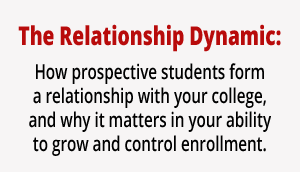
I told Joseph that more important than my opinion is that of the more than 12,000 prospective students that recently shared their thoughts with us. They were very clear on the importance of the admission counselor in the college selection process. They even weighed in on the effectiveness of social media marketing. Moreover, they were very specific about what traits and attributes make an admission counselor most effective.
We will soon be releasing a comprehensive report of the findings from our most recent co-sponsored study, “The Relationship Dynamic,” with more than 40 private and public colleges and universities joining forces to explore how prospective students form a relationship with a college, and why it matters in a college’s ability to grow and control enrollment. If you would like a copy of the full public report as soon as it is released, you can CLICK HERE to place your name on the distribution list.
How influential is the relationship building process? Very!
Over 80% of students say that the relationship they formed with their chosen college was influential in their decision to enroll. Nearly half of this group says it was “significant” in their decision. When asked to rate the strength of the relationship they formed with their chosen college (on a 10 high scale) leading up to their final decision 45% rated it 8 or higher.
Students often remember with specificity the circumstances and interactions related to the moment they felt they had formed a relationship with their chosen college. “The first time I met my admissions counselor,” one student said. Another said, “There was a part of the campus tour when we played games as a group and I felt like I was part of a family.” Yet another said, “I began receiving e-mails that were directed to my interests and not just in general for all students being accepted.”
Students were asked to identify and quantify the relative influence of specific interactions on their relationship with the college they selected. Across the board, social media scored in the neutral range whereas interaction with admission counselors ranged much higher, demonstrating a far greater influence on enrollment.
What qualities do top-notch admission counselors have that lead prospective students to bond with a college?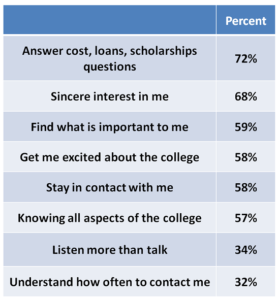
- They are knowledgeable and responsive. They know the answers to every question about their school, campus, costs, loans, scholarships, etc… And, if they are asked a question that they don’t have an answer for, they promise to find out fast.
- They demonstrate a sincere interest in the student. They get to know the prospective student as an individual and understand his or her particular needs, preferences and motivations.
- They connect the student to people, places and activities that will create excitement about the college. Because they have mastered #2, they know just who those people, places and activities should be.
- They make sure to let the students know that the college is interested in them. They stay in touch and are responsive.
We all know that a student’s college selection is tied closely to the strength of the relationship they build with a college over time. And we know that creating relationships is a multifaceted, nuanced and crucial part of student recruitment. What Joseph, and all admission counselors must know is this: Your role is crucial. You are a powerful motivator when you use all of the tools available to you.
We help colleges and universities with their recruiting efforts every day. If we can help you, please let me know. If you’ve thought about helping your staff with professional development, now is the ideal time to train and motivate your staff. Email or call me if you are interested in how we can help. Continue the conversation on Twitter @LongmireCo. For more information about Longmire and Company and the tools we have to offer, click here. We will be sharing more key insights from this study so be sure to subscribe to Versions of Conversion today so you can stay up-to-date.
We recently launched a series of free video training tutorials on our website and YouTube channel aimed at making your counselors even better at their jobs. On our website you’ll find an ever growing list of admission counselor tutorials. Subscribe to our YouTube channel for more tutorials, powerful data from national co-sponsored studies and interviews with some of your peers.
 Rick Montgomery is as an Enrollment Strategist at Longmire and Company. With over 20 years in higher education marketing, he brings an innovative and dynamic approach to helping colleges and universities meet their enrollment goals. Rick can be reached at 913/492.1265 x.708 or via email at rmontgomery@longmire-co.com.
Rick Montgomery is as an Enrollment Strategist at Longmire and Company. With over 20 years in higher education marketing, he brings an innovative and dynamic approach to helping colleges and universities meet their enrollment goals. Rick can be reached at 913/492.1265 x.708 or via email at rmontgomery@longmire-co.com.
 No matter what you call it, Yield Season, Crunch Time or The Finish Line, it’s NOW. Take a deep breath and keep on reading. We have new actionable information that will guide you toward greater success in the days and weeks ahead.
No matter what you call it, Yield Season, Crunch Time or The Finish Line, it’s NOW. Take a deep breath and keep on reading. We have new actionable information that will guide you toward greater success in the days and weeks ahead.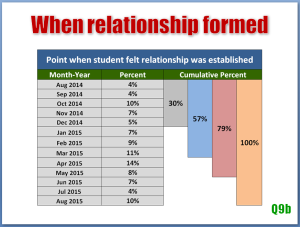
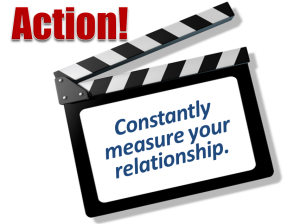 Admissions counselors who employ the direct approach tell us that they are often surprised by the depth of the answers they get when they specifically ask about a student’s level of excitement and the bonds they have with one or more colleges.
Admissions counselors who employ the direct approach tell us that they are often surprised by the depth of the answers they get when they specifically ask about a student’s level of excitement and the bonds they have with one or more colleges.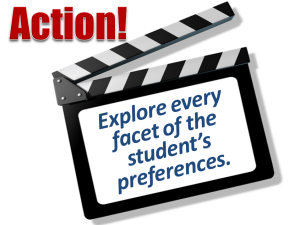


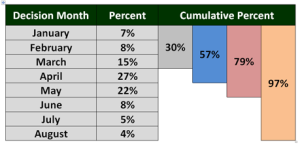

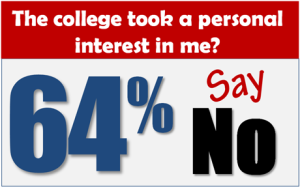
 Rick Montgomery is as an Enrollment Strategist at Longmire and Company. With over 20 years in higher education marketing, he brings an innovative and dynamic approach to helping colleges and universities meet their enrollment goals. Rick can be reached at 913/492.1265 x.708 or via email at rmontgomery@longmire-co.com.
Rick Montgomery is as an Enrollment Strategist at Longmire and Company. With over 20 years in higher education marketing, he brings an innovative and dynamic approach to helping colleges and universities meet their enrollment goals. Rick can be reached at 913/492.1265 x.708 or via email at rmontgomery@longmire-co.com.
